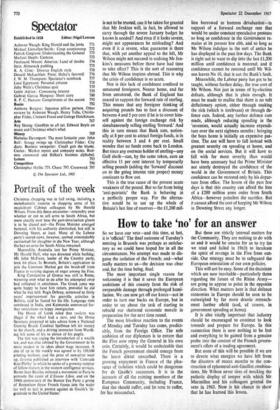Portrait of the week
Christmas shopping was in full swing, including a melodramatic exercise in shopping some of his recalcitrant Cabinet colleagues by Mr Harold Wilson. From this fierce encounter—ostensibly over whether or not to sell arms to South Africa, but more exactly over how the post-devaluation gloom is to be shared out—the Prime Minister emerged battered, with his authority diminished, but still in Downing Street, at least. Many of the Labour party's sacred cows, however, seemed unmistakably earmarked for slaughter in the New Year, although the ban on arms for South Africa remained.
Meanwhile, Australia lost her Prime Minister, Mr Harold Holt, who was drowned while bathing; Mr John McEwen, leader of the Country party, took his place. In Brussels, Britain's application to join the Common Market got the brush-off from France to varying degrees of anger among the Five.
King Constantine of Greece was still in Rome, wavering over what to do after his attempted coup had collapsed in anticlimax. The Greek junta was quite happy to have him return, provided he did what he was told. Regis Debray, sentenced to thirty years' imprisonment for guerrilla activities in Bolivia, said he feared for his life. Language riots continued in India, and Katmandu announced fur- ther restrictions on hippy immigration.
The House of Lords ruled that roulette was illegal if the wheel had a zero, and the Home Secretary proposed to take advice from a National Gaming Board. Cardinal Spellman left his money to the church, and a driving instructor from Worth- ing left some of his to eleven of his pupils.
The TUC was urging the introduction of a wealth tax, and was also advised by the Government to be more modest in its ideas about wage increases. A rise of up to 16s weekly was agreed to by 150,000 printing workers, and the price of newsprint went up. lzvestia published an interview with 'Comrade Kim Philby' in which he spoke of a growing number of fellow-traitors in the western intelligence services. Baron Jean Barclay initiated a movement in Paris to promote the cause of L'Ecosse Libre, and on the 194th anniversary of the Boston Tea Party a group of Bostonians threw French francs into the water (as well as tea) in protest against de Gaulle's 'in- gratitude to the United States.'


































 Previous page
Previous page